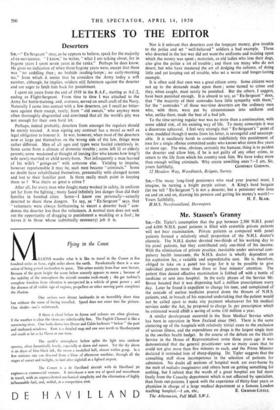Mr. Stassen's Granny S1R,—Dr. Tipler's assumption that the gap between
2,500 N.H.I. panel and 4,000 N.H.S. panel patients is filled with erstwhile private patients will not bear examination. Private patients as compared with panel patients formed a relatively small proportion of the N.H.I. doctor's clientele. The N.H.I. doctor devoted two-thirds of his working day to his panel patients, but they contributed only one-third of his income. With the elimination of private practice, inevitable under universal com- pulsory health insurance, the N.H.S. doctor is wholly dependent on his capitation fee, a variable and unpredictable sum. He is, therefore, obliged to take on a panel too large for it to be possible to give individual patients more than three or four minutes' attention. The patient thus denied effective examination is fobbed off with a bottle of medicine or sent into hospital. In the early phases of the Service Mr. Bevan boasted that it was dispensing half a million prescriptions every day. Later he found it expedient to change his tune, and complained of the cascade of useless' medicine poured down the throats of N.H.S. patients, and, in breach of his repeated undertaking that the patient would not be called upon to make any payment whatsoever for his medical services under the Act, he proposed to charge Is. per prescription which he estimated would effect a saving of some flO million a year.
A similar development occurred in the State Medical Service which has been in operation in New Zealand since 1941. There is the same cluttering up of the hospitals with relatively trivial cases to the exclusion of serious illness, and the expenditure on drugs is the largest single item in the swollen health budget. In the course of the debate on the Health Service in the House of Representatives some three years ago it was demonstrated that the general practitioner saw so many cases that he could not give more than five minutes to each, and the Prime Minister declared it reminded him of sheep-dipping. Dr. Tipler suggests that the consulting staff show incompetence in the selection of patients for admission. No doubt all sections of hospital work are over-borne by the mob of 'naiades imaginaires and others bent on getting something for nothing, but I submit that the wards of a great hospital are fed more freely from the Casualty department which is not officered by specialists, than from out-patients. I speak with the experience of thirty-four years as physician in charge of a large medical department at a famous London






































 Previous page
Previous page